

Global Economics. Economics (s243a - Delicious) Dynamics (economics) Economic antrhropology. Economic Jokes. Investing. Economic Myths. Economic News. Trade (economics) Types of Markets. Videos (Economics) Specific Economies. What's wrong with the Economy? 0 - tosort ecomics -> real trees. Economic forms & Ideologies. Privatization. Principles.economics. Metrics (economics)
Economic Movements. Economics Education. Economic Problems. Economic forms & Ideologies. Banking and such. Leceraged Loans. Social Issues Economics. Marketing. Recapitalization. Altertative Asset Managera. Zombie banks and systemic risk. 1.1 - economic (to sort) Economics. Economics. Research. Economy. Economy. Economic Theory and Bits.
Economy. Economics. Economy II. Economics. Economics. Economics.
Economics. Economics. Economic Alternatives. Balance of trade. Business ethics. Business ethics (also corporate ethics) is a form of applied ethics or professional ethics that examines ethical principles and moral or ethical problems that arise in a business environment.
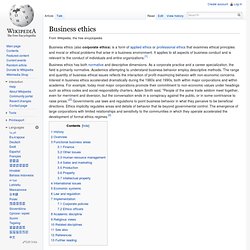
It applies to all aspects of business conduct and is relevant to the conduct of individuals and entire organizations.[1] History[edit] Business ethical norms reflect the norms of each historical period. As time passes norms evolve, causing accepted behaviors to become objectionable. Consumer spending. Macroeconomic factors affecting spending[edit] Taxes[edit] Taxes are a tool in the adjustment of the economy.
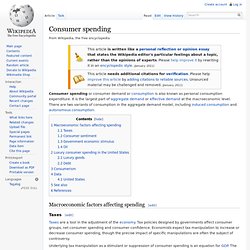
Tax policies designed by governments affect consumer groups, net consumer spending and consumer confidence. Economists expect tax manipulation to increase or decrease consumer spending, though the precise impact of specific manipulations are often the subject of controversy. Capitalism w/out racism. Economic equilibrium. In economics, economic equilibrium is a state where economic forces such as supply and demand are balanced and in the absence of external influences the (equilibrium) values of economic variables will not change.
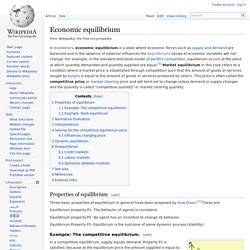
For example, in the standard text-book model of perfect competition, equilibrium occurs at the point at which quantity demanded and quantity supplied are equal.[1] Market equilibrium in this case refers to a condition where a market price is established through competition such that the amount of goods or services sought by buyers is equal to the amount of goods or services produced by sellers. Econometrics. Econometrics is the application of mathematics, statistical methods, and, more recently, computer science, to economic data and is described as the branch of economics that aims to give empirical content to economic relations.[1] More precisely, it is "the quantitative analysis of actual economic phenomena based on the concurrent development of theory and observation, related by appropriate methods of inference.
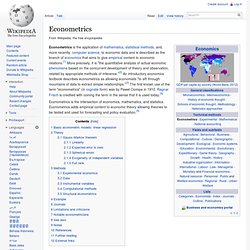
"[2] An introductory economics textbook describes econometrics as allowing economists "to sift through mountains of data to extract simple relationships. Economic system. Among existing economic systems, distinctive methods of analysis have developed, such as socialist economics and Islamic economic jurisprudence.
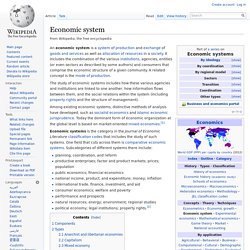
Today the dominant form of economic organization at the global level is based on market-oriented mixed economies.[1] Economic systems is the category in the Journal of Economic Literature classification codes that includes the study of such systems. One field that cuts across them is comparative economic systems. Subcategories of different systems there include: planning, coordination, and reformproductive enterprises; factor and product markets; prices; populationpublic economics; financial economicsnational income, product, and expenditure; money; inflationinternational trade, finance, investment, and aidconsumer economics; welfare and povertyperformance and prospectsnatural resources; energy; environment; regional studiespolitical economy; legal institutions; property rights.[2]
Exchange rate. In finance, an exchange rate (also known as a foreign-exchange rate, forex rate, FX rate or Agio) between two currencies is the rate at which one currency will be exchanged for another.
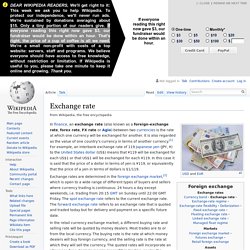
It is also regarded as the value of one country’s currency in terms of another currency.[1] For example, an interbank exchange rate of 119 Japanese yen (JPY, ¥) to the United States dollar (US$) means that ¥119 will be exchanged for each US$1 or that US$1 will be exchanged for each ¥119. Gift economy. A gift economy, gift culture or gift exchange is a mode of exchange where valuables are not sold, but rather given without an explicit agreement for immediate or future rewards.[1] In contrast to a barter economy or a market economy, social norms and custom govern gift exchange, rather than an explicit exchange of goods or services for money or some other commodity.[2] According to anthropologists Maurice Bloch and Jonathan Parry, it is the unsettled relationship between market and non-market exchange that attracts the most attention.
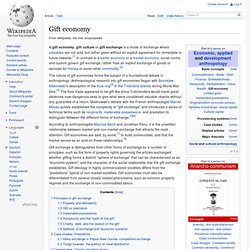
Gift economies are said, by some,[7] to build communities, and that the market serves as an acid on those relationships.[8] Government debt. Government debt (also known as public debt, national debt and sovereign debt)[1][2] is the debt owed by a central government.
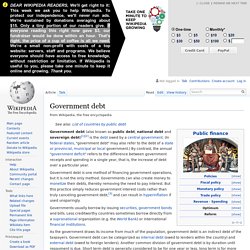
(In federal states, "government debt" may also refer to the debt of a state or provincial, municipal or local government.) By contrast, the annual "government deficit" refers to the difference between government receipts and spending in a single year, that is, the increase of debt over a particular year. Government debt is one method of financing government operations, but it is not the only method. Governments can also create money to monetize their debts, thereby removing the need to pay interest. But this practice simply reduces government interest costs rather than truly canceling government debt,[3] and can result in hyperinflation if used unsparingly. Gross national product. Gross national product (GNP) is the market value of all the products and services produced in one year by labor and property supplied by the citizens of a country.

Unlike Gross Domestic Product (GDP), which defines production based on the geographical location of production, GNP allocates production based on ownership. GNP does not distinguish between qualitative improvements in the state of the technical arts (e.g., increasing computer processing speeds), and quantitative increases in goods (e.g., number of computers produced), and considers both to be forms of "economic growth".[1] Basically, GNP is the total value of all final goods and services produced within a country in a particular year, plus income earned by its citizens (including income of those located abroad)(no need to minus income of non resident as income includes of only its citizen). Gross domestic product. Gross domestic product (GDP) is defined by the Organisation for Economic Co-operation and Development (OECD) as "an aggregate measure of production equal to the sum of the gross values added of all resident, institutional units engaged in production (plus any taxes, and minus any subsidies, on products not included in the value of their outputs).
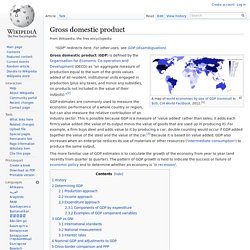
Economic history. Development as a separate field[edit] Treating economic history as a discrete academic discipline has been a contentious issue for many years. Inflation. In economics, inflation is a sustained increase in the general price level of goods and services in an economy over a period of time.[1] When the price level rises, each unit of currency buys fewer goods and services. Consequently, inflation reflects a reduction in the purchasing power per unit of money – a loss of real value in the medium of exchange and unit of account within the economy.[2][3] A chief measure of price inflation is the inflation rate, the annualized percentage change in a general price index (normally the consumer price index) over time.[4] The opposite of inflation is deflation. History[edit] Annual inflation rates in the United States from 1666 to 2004.
Historically, infusions of gold or silver into an economy also led to inflation. From the second half of the 15th century to the first half of the 17th, Western Europe experienced a major inflationary cycle referred to as the "price revolution",[22][23] with prices on average rising perhaps sixfold over 150 years. Informal sector. The informal sector or informal economy is that part of an economy that is not taxed, monitored by any form of government or included in any gross national product (GNP), unlike the formal economy.[1] Other terms used to refer to the informal sector can include the black market, the shadow economy, the underground economy, the agora, and System D.
Associated idioms include "under the table", "off the books" and "working for cash". Definition[edit] Interest rate. An interest rate is the rate at which interest is paid by borrowers (debtors) for the use of money that they borrow from lenders (creditors). Specifically, the interest rate is a percentage of principal paid a certain number of times per period for all periods during the total term of the loan or credit. Interest rates are normally expressed as a percentage of the principal for a period of one year, sometimes they are expressed for different periods like for a month or a day.
Different interest rates exist parallelly for the same or comparable time periods, depending on the default probability of the borrower, the residual term, the payback currency, and many more determinants of a loan or credit. For example, a company borrows capital from a bank to buy new assets for its business, and in return the lender receives rights on the new assets as collateral and interest at a predetermined interest rate for deferring the use of funds and instead lending it to the borrower. Microeconomics. This is in contrast to macroeconomics, which involves the "sum total of economic activity, dealing with the issues of growth, inflation, and unemployment. Millennials are conservative, cheap and could be the wisest generation. Economic Risks. Stock market. Thermoeconomics.
Unemployment. Voluntary sector. The voluntary sector or community sector (also non-profit sector or "not-for-profit" sector) is the sphere of social activity undertaken by organizations that are not for profit[1] and non-governmental. World economy. Economists. Economic History. Social Sciences. Humanities & social sciences. Subjects of learning. 2 - root node (my real tree Pearl Trees Version 1.0)